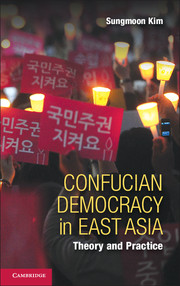Book contents
- Frontmatter
- Dedication
- Contents
- Acknowledgments
- Introduction
- Part I Beyond Thick Confucian Communitarianism and Meritocratic Elitism
- Part II Confucian Democracy in Theory – A Pluralist Reconstruction
- 4 Value Pluralism and Confucian Democratic Civil Society
- 5 Confucian Familialism and Public Reasoning
- 6 In Defense of Confucian Democratic Welfarism
- 7 Rethinking Political Meritocracy: Selection Plus Two
- Part III Confucian Democracy in Practice – The Korean Case
- Bibliography
- Index
- References
6 - In Defense of Confucian Democratic Welfarism
Published online by Cambridge University Press: 05 June 2014
- Frontmatter
- Dedication
- Contents
- Acknowledgments
- Introduction
- Part I Beyond Thick Confucian Communitarianism and Meritocratic Elitism
- Part II Confucian Democracy in Theory – A Pluralist Reconstruction
- 4 Value Pluralism and Confucian Democratic Civil Society
- 5 Confucian Familialism and Public Reasoning
- 6 In Defense of Confucian Democratic Welfarism
- 7 Rethinking Political Meritocracy: Selection Plus Two
- Part III Confucian Democracy in Practice – The Korean Case
- Bibliography
- Index
- References
Summary
In Chapter 3, I took issue with the sufficientarian interpretation of the Confucian perspective of social justice, not only because of its idiosyncratic attempt to draw sufficientarian implications from the Chinese term zu 足 (often translated in English into “sufficient”) without much consideration of sufficientarianism’s background ethics (evidenced in Harry Frankfurt’s work), but also because of the negative thesis implicated in sufficientarianism which rejects egalitarian and prioritarian reasoning at least above some critical threshold. Indeed, given Confucianism’s strong commitment to the (moral and material) well-being of the people, it is hard to dispute Joseph Chan’s core contention that according to Confucianism, people who are worst off have first priority for care, which is highly compatible with John Rawls’s difference principle and his idea of social minimum. My problem with Chan’s view lies in his supplementary claim that inequalities of wealth and income beyond the threshold of sufficiency do not matter, a claim that he rationalizes primarily with reference to Xunzi, who singles out merit and contribution (as opposed to family background) as the only legitimate source of emolument.
It is debatable whether the fact that Xunzi advocated the meritocratic emolument system, in the face of strong feudal aristocratic oppositions during the Warring States period, can be construed as an endorsement of inequalities beyond the threshold of sufficiency. But this interpretative issue, however important, is not my primary concern in the present chapter, nor am I interested in the philosophical investigation of which distributive principle Confucianism as an ethical system supports, between egalitarianism, prioritarianism, and sufficientarianism, all of which tend to favor less advantaged individuals when their interests conflict with those of more advantaged individuals. Rather, my concern here is discovering the best way to realize the Confucian commitment to the people’s material well-being in the given contemporary socioeconomic and political context of East Asian societies. In this regard, what commands our attention in Chan’s sufficientarian claim is not so much its positive thesis, a point that is generally supported by all three distributive principles, but Chan’s perfectionist justification of economic meritocracy beyond the threshold of sufficiency.
- Type
- Chapter
- Information
- Confucian Democracy in East AsiaTheory and Practice, pp. 154 - 178Publisher: Cambridge University PressPrint publication year: 2014



